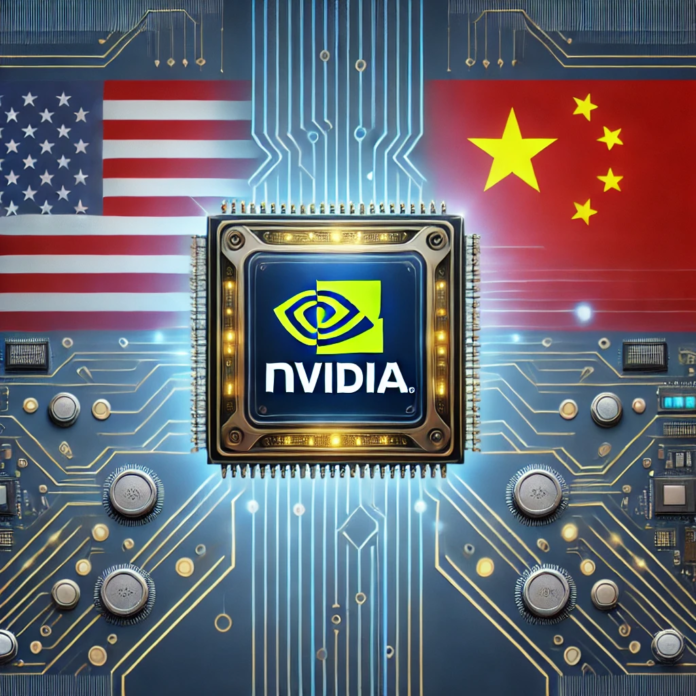China has launched an official investigation into Nvidia, one of the world’s leading chipmakers, over potential breaches of anti-monopoly laws. This move, announced by China Central Television on Monday, has already caused Nvidia’s shares to fall by more than 2% in premarket trading.
The investigation, led by China’s State Administration for Market Regulation (SAMR), comes amid rising tensions in the global technology sector and has raised questions about Nvidia’s practices and its role in the escalating tech rivalry between China and the United States.

Table of Contents
Brief Overview of Nvidia
| Aspect | Details |
|---|---|
| Founded | 1993 |
| Headquarters | Santa Clara, California, USA |
| Key Products | Graphics Processing Units (GPUs), AI Chips, Data Center Solutions, Gaming Hardware |
| Market Leadership | Leading provider of AI chips and GPUs, widely used in gaming, AI, and data processing sectors |
| Key Markets | Global, with significant operations in the US, China, and Europe |
| Notable Innovations | CUDA platform, RTX technology, and AI-focused chips like the H100 and A100 |
| Stock Symbol | NVDA (NASDAQ) |
| Recent News | Under investigation by China for alleged anti-monopoly law breaches; shares recently declined |
Why Did China Investigate Nvidia?
China’s decision to investigate Nvidia stems from concerns that the company might be abusing its dominant position in the AI chip market. Nvidia is a leader in the production of advanced AI chips, which are critical for industries like autonomous driving, data processing, and artificial intelligence research.
This dominance has raised alarms among Chinese regulators, who are tasked with ensuring fair competition. The suspicion is that Nvidia might be engaging in practices that stifle competition or harm local businesses. Anti-monopoly laws in China aim to prevent companies from exploiting their market power in ways that hurt innovation or limit consumer choice.
Additionally, the geopolitical backdrop cannot be ignored. The United States has imposed strict export controls, barring Nvidia from selling its most advanced chips to Chinese firms. This has limited China’s ability to develop cutting-edge technologies, particularly in artificial intelligence and military applications. Some analysts believe the investigation could be China’s way of countering these restrictions by scrutinizing Nvidia’s operations more closely.
The Bigger Picture: US-China Tech Rivalry
The investigation is also tied to the larger tech competition between the US and China. Nvidia has tried to navigate this by creating AI chips that comply with US export rules while still meeting the needs of its Chinese clients. However, these compromises haven’t fully satisfied Beijing.
China views the US restrictions as an attempt to stifle its technological growth. By probing Nvidia, China could be aiming to challenge American dominance in critical tech areas and assert its regulatory power over foreign companies operating within its borders.
US Export Restrictions on Nvidia
| Aspect | Details |
|---|---|
| What the Restrictions Are | Ban on selling advanced AI chips (e.g., A100, H100) to Chinese firms. |
| Targeted Technologies | AI chips used in high-performance computing, AI model training, and supercomputing. |
| Reasons for the Ban | – National security concerns. – Preventing military and surveillance applications. – Slowing China’s tech progress. |
| Compliance Requirements | Nvidia must seek special export licenses for restricted chip sales to Chinese clients. |
| Nvidia’s Response | Created modified chips (e.g., A800, H800) with reduced performance to meet export rules. |
| Impact on Nvidia | Limited access to a significant market, potential revenue loss from Chinese clients. |
| Impact on China | Slower progress in AI and advanced technology development. |
| Global Implications | Intensifies US-China tech rivalry and affects global semiconductor supply chains. |
What the Restrictions Entail
- Ban on Advanced AI Chips: Nvidia is prohibited from selling its most sophisticated AI chips, such as the A100 and H100, to Chinese companies. These chips are critical for training AI models, including those used in advanced technologies like autonomous systems and natural language processing.
- Focus on AI and Supercomputing: The restrictions target chips that meet specific performance benchmarks, particularly those used in AI research and high-performance computing.
- Compliance Measures: Nvidia must seek special export licenses to sell restricted chips to Chinese clients, making it harder for Chinese firms to access cutting-edge technology.
Reasons for the Restrictions
- National Security: The US government fears that advanced AI chips could be used by China to develop military technologies, including surveillance systems and autonomous weapons.
- Tech Rivalry: The restrictions aim to slow down China’s progress in becoming a global leader in AI and supercomputing, areas that are critical for economic and strategic dominance.
- Supply Chain Control: The US wants to maintain its edge in semiconductor innovation and prevent China from gaining undue leverage in the global tech supply chain.
Nvidia’s Response
To comply with these restrictions, Nvidia has developed modified versions of its chips, such as the A800 and H800, designed to meet Chinese market needs while adhering to US export rules. These chips have reduced performance capabilities compared to their advanced counterparts, ensuring they fall below the thresholds outlined in the restrictions.
Impacts of the Restrictions
- On Nvidia: These limitations restrict Nvidia’s access to a significant market, potentially reducing revenue from Chinese clients. China is one of Nvidia’s largest markets for AI and data center chips.
- On China: Chinese companies face challenges in accessing the most advanced AI technologies, which could slow their progress in AI development and research.
- On Global Tech: The restrictions have intensified the US-China tech rivalry, affecting global supply chains and sparking similar regulatory moves in other countries.
The US export restrictions on Nvidia are part of a larger strategy to contain China’s tech ambitions. While they aim to secure US technological superiority, these measures also create new challenges for global trade and innovation. For Nvidia, this means navigating a complex landscape where compliance and market demand often conflict.
Current impact on Nvidia and Global Markets
The investigation has already impacted Nvidia’s stock value. If the company is found guilty of anti-competitive practices, it could face penalties, restrictions, or operational changes in China—a key market for its products. This could not only disrupt Nvidia’s revenue streams but also influence global chip supply chains.
At the same time, this probe signals that regulators worldwide are intensifying their scrutiny of tech giants. Nvidia’s case underscores how geopolitical and economic factors can collide in the high-stakes world of technology.
My Opinion
In my opinion, this investigation highlights the complexity of operating in a globalized yet fragmented market. While it’s crucial to ensure fair competition, the timing of this probe seems strategic, considering the US export restrictions on Nvidia. It’s clear that geopolitical tensions are shaping how tech companies are regulated.
For Nvidia, this situation is a double-edged sword. It has to comply with US rules while navigating China’s regulatory framework. This dual pressure could slow innovation and harm relationships with both governments. I believe that fostering open trade and transparent business practices is essential to avoid these standoffs.
Conclusion
China’s investigation into Nvidia is about more than anti-monopoly laws—it’s a reflection of the global tech rivalry between two superpowers. The probe highlights concerns over market fairness but also serves as a reminder of how political tensions can affect business decisions.
For Nvidia, the stakes are high, and the outcome could reshape its role in the global chip market. This case serves as a warning to other tech giants about the growing challenges of operating in politically charged environments. Balancing innovation with compliance is no longer optional—it’s a necessity.



